- Home
- Fletcher DeLancey
Do You Feel What I Feel. a Holiday Anthology Page 17
Do You Feel What I Feel. a Holiday Anthology Read online
Page 17
“Some of it went to Mom’s friends.” Elena’s voice was harsh and had no room in it for discussion. Joan winced in sympathy, noting the way Fred cringed. “Some of it I have in storage, and a few pieces I sold.”
Laura clucked in disapproval. “I know your mother left you this place, Ellie, but it’s not as if other people don’t have memories here. Your father used to come here with your mother, too.”
It was exactly the wrong thing to say, and Joan had spotted three more of the awful creatures scurrying under the old leather couch. How did they even fit? She needed to get Elena away. Maybe they were just part of the decor. Maybe giants kept symbiotic elves.
Maybe Elena was going to kill her stepmother and then claim, the way that hunters who’d gone rouge would, that the woman was really a banshee.
“I followed my mother’s instructions exactly.” Elena’s every word dripped ice.
“Honey,” Laura tried, seemingly oblivious to the ice, “Stephania died suddenly. She can’t have worked out all of this with you. And some of those pieces, well, they were important to all of us.”
“My mother had an extensive will.” Elena stared Laura down. “Don’t you?”
“Hey, Lena, you were going to show me how this wood stove works.” Joan grabbed her wife’s arm. “Come on, love, we want to get something heating up for dinner. That will help make this place feel lived in again, don’t you think?” She hauled on Elena’s arm, hoping to move her by social pressure. Accountants didn’t employ fireman’s carries as far as Joan knew.
“And some cookies,” Laura called. They both ignored her.
“Right.” Elena let herself be dragged. “It’s a bit tricky, but once you get used to it, it’s a bit fun.”
“I’m sure. You know how I feel about flames, Lena.” She bent down next to the contraption so that her lips were near her wife’s ear. “Did you see—”
At the same time, Elena hissed at her. “Remember my first bogey?”
They shared a glance. “The little elf thing?” Joan whispered. “We need the Compendium.”
“So it’s just like any other wood-burning stove, except you have to stack a little more narrowly.” Elena piled kindling into the firebox. “Things. This place is infested, but they’re not like any other goblins in the book—”
“What about the tapestry that hung over the fireplace?” Fred’s voice came from far too close, just a few feet behind them. If there had been anything on which to bump their heads, both Elena and Joan would be nursing concussions. As it was, Joan fumbled the box of matches in her hands.
Elena, damn her, remained calm and cool. “It’s hanging in our living room—in the place Joan and I call home.”
He twisted his lips up unhappily. “I see.” If Elena had used that tone of voice, Joan would have prepared for a nuclear explosion. “That was your mother’s wish?”
There were three little elf-creatures standing behind him. One of them was making a face, twisting its lips up like Fred’s. Another one was dropping its trousers.
“Here, Fred, please help me get this thing lighted.” Joan threw all compunction to the wind and gave him her best helpless-woman smile. “If there’s a problem with the way Elena’s inheritance was divided up, I’m sure we can work it out some time later.”
“Ah. You’re the accountant, right?” Fred’s smile was sad and a little crooked. “I don’t want to get math involved in this. I just worry sometimes about my Stephania’s things and her wishes—”
“And what about her house—”
“Lena, my love,” Joan interrupted, “could you make sure I got the right bedroom? This place is giant, and I was a bit rushed with our company arriving.”
Elena glared at her for a solid five seconds before the word company clicked. “Sure, darling. Dad, don’t let her burn her fingers. I might need those later. For fondue and spooning and things.”
Fred and Joan sat there, staring at each other uncomfortably, until Elena left the room—stomped out of the room…flounced even.
“It’s been hard—” they both began. Joan laughed first.
“It hasn’t been an easy year,” she offered, “for either of us. Trouble—trouble at work.”
As much of an ass as Nathan had been, watching him die had been awful. And there’d been that mess with the Shtriga, and the living dolls had been pretty nerve-wracking.
“Her mother’s death was hard on all of us,” Fred offered in return. “Here, use the long matches. You want to get the flame right in the middle of the kindling.” He demonstrated. “Then it’s just letting the stove get hot.”
“Like you and Laura?” While Joan was still trying to figure out if she should take it back, Fred blushed uncomfortably.
“Like Laura and I. The kindling was there, I suppose. Lots of fondue. And then Stephania was dead, and… Elena hates her, doesn’t she?”
What could she say? Joan shrugged, keeping her eyes on the fire. “Elena has big opinions on every—”
“What in the seventeen names of Baal… I… Joan is that?”
Shit, shit, shit. Joan turned around slowly to find a small elfin creature just a few feet away. It reached up onto the counter and very deliberately knocked the bag of groceries onto the floor.
“Shit!” Pickles sausages, cheese, and a very long coil of hemp rope came spilling out, along with a pile of loose herbs. The pickle jar broke against the stone floor of the kitchen.
“Oh, lovely.” The creature hurried off, only to be replaced by three more, each of them pulling drawers and doors open. “They’re goblins with cat personalities.” Joan wrinkled her nose in disgust.
All three creatures—no, now there were seven—looked at her. One had found the knife drawer. Another had found the weapons Joan and Elena had shoved into the kitchen cupboard. One was gnawing on the end of a stick of pepperoni. And now there were nine.
“Should I ask why you have rope in your groceries?”
“Hammock,” Joan answered readily. The stove was behind them, but behind that was the back door. She took Fred’s arm.
“Right. And the guns?”
“Those were here when we got here,” she answered honestly. The door swung open behind them, just as one of the goblins leveled the ancient rifle with the modern scope at Fred. “Oh, no you don’t.” Training and instincts took over. Joan calculated route, grabbed the fireplace poker, and tightened her grip on Fred’s arm. “Follow me.”
“Now bring us some figgy pudding.
Now bring us some figgy pudding.
Now bring us some figgy pudding and
bring it right now.”
The sudden song rang from the living room, where they’d left the stepmother. She had a lovely voice which, in the last notes, twisted upwards into something like a wail.
Joan, in a brief moment of hysteria, thought, Banshee? before all of the creatures started running into the living room. She grabbed the antique rifle from one of them as it passed her and followed, poker in one hand, rifle in the other, hoping she didn’t have to shoot her stepmother-in-law.
Laura was standing on the hearth, the fireplace open, wielding a fireplace poker in one hand and a spray bottle in the other. She had started on the next verse.
“We won’t go until we get some;
We won’t go until we get some;
We won’t go until we get some;
so bring some it right now.”
The elves seemed mesmerized, jostling ever closer to her. And there were so many of them, dozens and dozens, one wielding a kitchen knife and another carrying a bag of flour. On the other side of the room, Elena was perched on the stairs, holding the viper’s-head cane in one hand and the thick Compendium in the other. It looked as if she had been fending off her own pile of the creatures until the singing began.
“Duck!” Laura sang out. Joan had excellen
t reflexes; she ducked, pulling Fred down with her, although he seemed to need far less help than she’d expected.
The spray gun went off in a series of hissing noises that were quickly echoed by the creatures. Every single elf-thing started running for the open stove door, and the smell of ginger quickly filled the air. Where the water hit the creatures, they melted, dissolving in a puddle of goo. Laura sprayed and sang, sprayed and sang, wielding “We Wish You a Merry Christmas” as a weapon.
When the last of the creatures had fled or melted, Laura dropped her arms and looked around at them.
“The one thing I never could stand about this cabin,” she declared tiredly, “was the damn elves. Seriously, kids, you have to start baking cookies if you’re going to live up here. The lore gets lost along the way, I know—but cookies. I’m sure even an accountant can handle that.”
Elena flipped through the Compendium. “Elves,” she read, her voice far too calm. “Variety: winter. Once fended off by ginger cookies left at the hearth and the front door. Extremely rare, thought to enjoy cold regions and mountains. It’s in the possibly apocryphal section.”
“Oh.” Laura’s head went up. “Is that Tedwithle’s Compendium? Oh, good. You kids aren’t completely helpless then. What?” She looked around the room again. “Do you think all we did up here was fondue and spoon? Yetis put a kibosh on skinny-dipping really fast, I can tell you that.”
Joan looked between Laura, Fred, and Elena. “Merry Christmas to all,” she murmured. At least they wouldn’t have to spend the rest of the trip lying about it.
Fred met her gaze and smiled, perhaps sadly, perhaps only a little tiredly. “And to all a good night. Let’s get dinner on the stove before the yetis attack, shall we?”
SADIE AND ROSA
by Alison Solomon
Sadie Green pulled her aging frame out of the blue velvet recliner in the living room of the well-appointed condo she shared with her lover, Rosa.
“I have something for you,” she said as she walked over to the dining alcove, “a Hanukkah gift.” The dining table was covered with a blue and white cotton tablecloth that they’d brought back from their most recent trip to Israel.
Rosa was in the process of picking candle wax off the brass menorah which sat in the center of the table. “I thought we agreed we wouldn’t do gifts.”
“I know, but this is something special.” Sadie tried to take Rosa’s hand, but Rosa pulled it back.
“You shouldn’t have,” she said. “But since you did, you can give it to me later, when we light the candles.”
“Better yet, you could come with me to Johnny’s, we’ll all light candles together, and I’ll give it to you there.” Sadie couldn’t hide the hopeful tone that crept into her voice.
Rosa huffed. “You know I won’t.”
“I’m tired of it, Ro,” said Sadie, straightening the tablecloth. “We’re seventy years old. These days everyone is out.”
“Maybe they are in the schools your grandchildren attend, but people our age don’t come out to their families.”
“Yes, they do! Times have changed. We’re not the only ones who watched Grace and Frankie and Transparent.”
“That was television, not real life.” Rosa hobbled slowly over to the maple credenza, bending to her right, her left hand holding the small of her back, which never seemed to stop bothering her. She pulled out a small packet of candles to place next to the menorah.
Watching her, Sadie thought back to the first time they’d lit Hanukkah candles together.
It had been the last night of Hanukkah. Sadie was sitting awkwardly by herself in the synagogue social hall, the first time she’d attended an event since Mark had died. Friends had come up to her to express their condolences, but no one had actually offered to sit with her or invited her to sit with them. She wondered whether they thought widowhood was contagious. An olive-skinned woman with large waves of undulating silver hair approached the table.
“May I sit here?”
Sadie didn’t recall ever having seen the woman before. “Of course.”
The two of them sat at the large trestle table that could easily accommodate another ten people and watched as couples settled in at the other tables. Sadie unwrapped one of the many chocolate gold coins scattered upon the table and popped it into her mouth.
“Looks like we’ll have plenty of sufganiot to ourselves,” the woman said, pointing at the plate in the center of the table piled with a dozen jelly donuts.
“Plenty of—?”
“Sufganiot—donuts. I’m Rosa Toledo, by the way.” She held her hand out toward Sadie, who grasped it and noted what a good, firm grip Rosa had. She couldn’t stand those women whose fingers floated toward her hand like jellyfish swaying in the ocean.
“Sadie Green. So are you a Hebrew expert?”
“No, the word was just in my mind because I was in Israel last year for Hanukkah.”
“Me too! My daughter lives there, but I’ve never been able to get to grips with the language. I like celebrating Hanukkah in Israel because they don’t make such a big deal of it.”
“I think it only became a major holiday here because Jewish kids felt so left out of the Christmas gift-giving frenzy.” Rosa ran her hand through her silver waves of hair and shook them out.
“Absolutely. And the politically correct folks thought they were being inclusive when they tacked Hanukkah and Kwanzaa onto everything to do with Christmas.”
“Of course, if they really were PC, they’d know that it’s much more important to wish us a happy New Year in September than to shower us with ‘happy holidays’ greetings at Christmastime.”
Sadie smiled. “We sound like the crabby old people who have bumper stickers and yard signs exhorting the neighborhood to keep the Christ in Christmas.”
“But I agree with them. At the university they used to call the big event in December a holiday party. But they wouldn’t have been holding it if it weren’t Christmas! They didn’t do anything for Rosh Hashanah or Purim, did they?”
When the rabbi asked everyone to stand up and gather around the communal menorah so that they could light the candles, Sadie found herself disappointed. She’d been enjoying the animated conversation with this new woman so much that, surprising herself, she asked Rosa for her phone number.
They met for coffee the following Monday and decided to make it a regular occurrence. They learned about each other’s histories: Rosa had grown up in Spain and immigrated to the USA when she was in her twenties. She’d taught Spanish at the local college and now enjoyed traveling in Europe and South America. She didn’t have children, and she’d never felt the need to get married. Sadie told Rosa about her reasonably happy marriage, her daughter Hannah in Israel, and her son, who lived nearby in a Philadelphia suburb. After a few weeks, they started meeting for lunch on Wednesdays, which led to Sadie inviting Rosa for Shabbat dinner on the Friday night before Passover.
As she prepared the brisket, Sadie found herself humming a tune that had come into her mind unbidden, one she hadn’t sung for so long it was almost forgotten. She tried to place it. A melody they used to sing on Friday nights. But where? When? Trees… sunshine… summer camp! Yes, Bnai Brith summer camp in the Catskills, that was it. All the kids singing and then Jenny Cohen grabbing her hand and pulling her into the empty parking lot behind the dining hall, asking her if she’d ever kissed a girl… Wow, she hadn’t thought about that incident for fifty years.
When Rosa arrived, her silver hair was piled on top of her head, and sparkling stars dangled from her ears. Her long black caftan, embroidered with purple and blue threads, accentuated her height. In her arms, she carried three enormous bright yellow sunflowers, which she thrust toward Sadie.
“Shabbat Shalom,” Rosa said and leaned forward to kiss her friend on the cheek.
Sadie felt a fluttering in her stomach as she accepted
the flowers and the kiss. Her thoughts and heart both raced toward the same conclusion: Rosa was gorgeous.
“You’re sure you won’t come with me?” Sadie picked up her purse and keys. “Not too late to change your mind.”
Rosa handed Sadie her raincoat. “Don’t start all that again. Your daughter-in-law says first night is only for family members. And as far as your family is concerned, I’m just your roommate and best friend; and that’s the way I want it.”
They’d been having the same argument on and off in different versions for the last five years they’d been together, ever since the first trip they took to Israel, when everything changed between them. On that trip, Ro had asked Sadie if she’d ever climbed Masada to see the sunrise, and when Sadie admitted she hadn’t, they made a plan to start climbing Snake Path with all the teenagers and young people at four o’clock in the morning. As they stood on the top of the mountain, watching the sun begin to peek out from the dark horizon far below, Ro turned to Sadie.
“The year I’ve spent getting to know you has been one of the happiest of my life. I don’t want to lose your friendship, but I have to tell you something.”
Sadie kept her eyes on the horizon, watching the dark sky turn pink and the sliver of sun turn into a glowing ball. She had a feeling she knew what was coming. She’d been wanting to hear it and dreading it at the same time.
“You wouldn’t be the first woman I’ve fallen in love with,” Ro said, “but I’m hoping you’ll be the last.”
The Dead Sea became visible in the light, and Sadie’s heart pulsed in rhythm with the sun.
“I… you… have you…?” She didn’t know how to form her thoughts into words.
“I have. Not for a long time. I didn’t think I’d ever find anyone I wanted to be with permanently, and then I met you,” Rosa said. “I love being your friend, but I want to be more than that.”

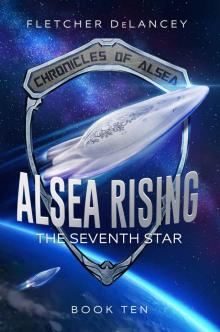 Alsea Rising: The Seventh Star (Chronicles of Alsea Book 10)
Alsea Rising: The Seventh Star (Chronicles of Alsea Book 10)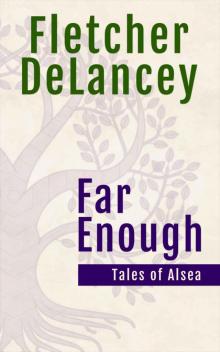 Far Enough
Far Enough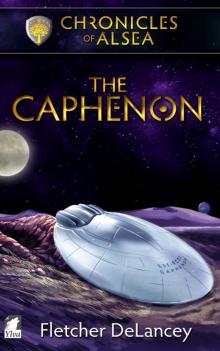 The Caphenon
The Caphenon Catalyst
Catalyst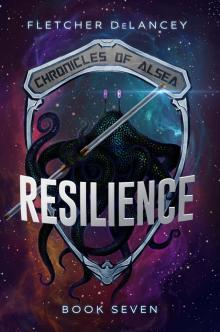 Resilience
Resilience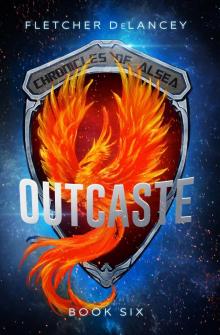 Outcaste
Outcaste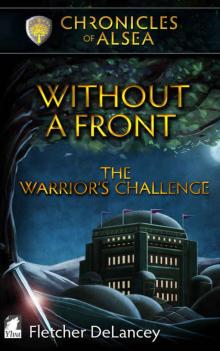 Without a Front: The Warrior's Challenge (Chronicles of Alsea Book 3)
Without a Front: The Warrior's Challenge (Chronicles of Alsea Book 3)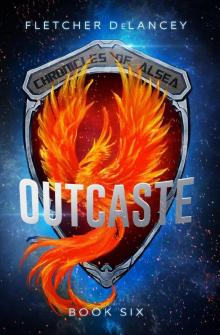 Outcaste: Book Six in the Chronicles of Alsea
Outcaste: Book Six in the Chronicles of Alsea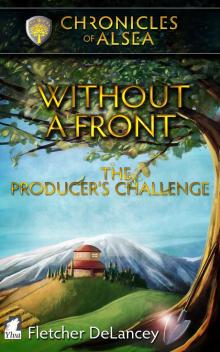 Without a Front
Without a Front Do You Feel What I Feel. a Holiday Anthology
Do You Feel What I Feel. a Holiday Anthology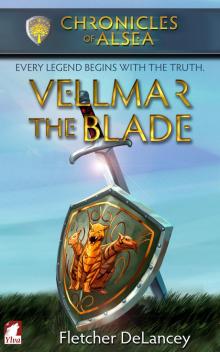 Vellmar the Blade
Vellmar the Blade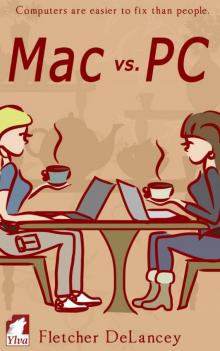 Mac vs. PC
Mac vs. PC